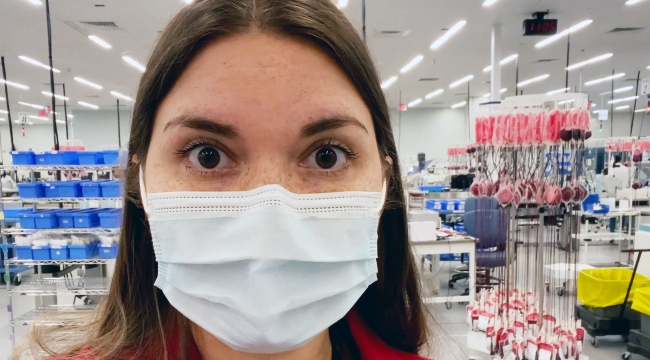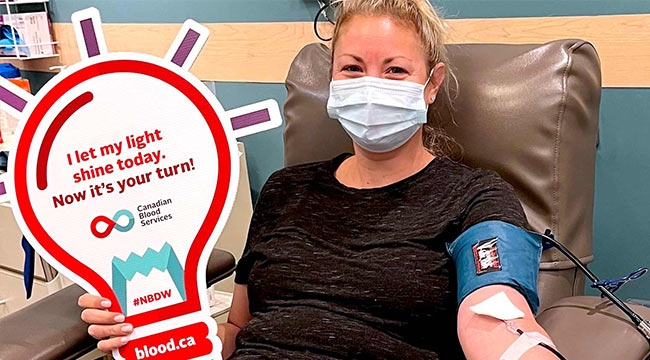The science of giving
Sociologist Dr. Jennie Haw is helping us understand donors better, so Canada’s Lifeline can be even more inclusive
“Through my many interviews with donors, I’ve seen the meaning and value that donation holds for people,” says Dr. Jennie Haw. “Their vital contributions to Canadian Blood Services clearly have social significance, as well as health significance. So it’s important to ensure that our policies are as equitable as possible.” Dr. Haw has brought an important new dimension to our research efforts as one of two social scientists in the Centre for Innovation. Since joining the team in 2019 along with her colleague Dr. Kelly Holloway, Dr. Haw has been deepening our understanding of donors’ attitudes and behaviours, helping us respond more effectively in an evolving social context. “Advancing social justice and health equity has always been an important theme in my education and work,” she says. “It’s something I feel passionate about.”
Timely, relevant and equitable
Two of Dr. Haw’s ongoing research projects explore issues of equity for gay, bisexual and other men who have sex with men. Currently, men in Canada cannot donate blood if they have had sexual contact with a man in the previous three months. But this waiting period, which was reduced from one year to three months, is an incremental step toward a far better solution: sexual behaviour-based assessments for all donors. Canadian Blood Services intends to make a submission recommending this approach to Health Canada by the end of 2021. Pending regulatory approval, we look forward to adopting eligibility screening that evaluates the sexual risk factors of individuals rather than overall populations.
The shift in screening will mean developing sexual behaviour questions for existing donors, as well as new ones. “One of the projects I’m working on is assessing current donors’ views of proposed new questions regarding alternative sexual behaviour,” Dr. Haw explains. “Do people understand the questions? How comfortable or uncomfortable do they feel about answering and why? And even more important, what might help to mitigate their discomfort?”
A second, related research project focuses on people who are not currently eligible to donate whole blood or plasma. The project will invite a diverse group of gay, bisexual and other men who have sex with men, as well as trans and non-binary individuals, for their views on potential new donor questions and revised screening processes. Both projects — along with 19 others led by scientists in a range of disciplines — are funded by Health Canada as part of a rigorous multi-year assessment of proposed changes to donor screening and eligibility. Sociological insights are vital to ensuring that any suggested changes are relevant, timely and viewed as equitable by the communities they affect, including Canadians who are currently excluded from donation and are troubled by the slow pace of change.
Widening the investigation
Extending her social science perspective to other areas of donor engagement, Dr. Haw is working with the Sickle Cell Disease Association of Canada and Sickle Cell Foundation of Alberta to examine barriers to blood donation for African, Caribbean and Black young adults. While many patients who need transfusions can receive blood that simply matches their ABO type, others require a more precise match that is only available from donors of similar ancestral backgrounds.
This is the case for many patients with sickle cell disease, a condition that largely affects Black and other racialized Canadians. Dr. Haw’s research, by discovering more about potential donors of these lifesaving transfusions, could help us increase their numbers. She is conducting this community-based project in collaboration with the Sickle Cell Disease Association of Canada and the Sickle Cell Foundation of Alberta.
Read more about sickle cell disease and Canadian Blood Services’ role in helping patients.
The researcher’s conversations with donors about eligibility screening have also revealed generational differences in the way people think about donation — another line of inquiry that could shape future recruitment efforts. “The oldest participant I interviewed was 82 and he talked about donation as a sacrifice,” Dr. Haw says. “At younger ages, people tend to speak of it as a gift or as something they might benefit from someday. So the social meanings of donation seem to change over time. I’m interested in exploring that evolution to see how the insights can help us.”
The Canadian Blood Services social science team is also exchanging knowledge and collaborating with peers who work for blood operators and researchers in other countries. A growing number of academics are studying the donation of biological essentials, including blood and blood products, human milk, sperm and eggs, and even fecal matter. Combining insights from psychology, sociology, political science and law, these pioneers are mapping out a new field of inquiry that has the potential to benefit donors, and therefore patients, worldwide.
“When I started doing research in this area, with a focus on cord blood banking, there was little feeling of community among researchers pursuing similar topics,” Dr. Haw recalls. “Now people are reaching out and becoming more connected as we expand the emerging field of donation studies.”
This story is one piece of our upcoming annual report (titled Changing Tomorrow) that celebrates how donors and employees stepped up to meet the challenges of today in order to ensure a healthier future for Canadians. Changing Tomorrow, will be available on our website in late October 2021.



